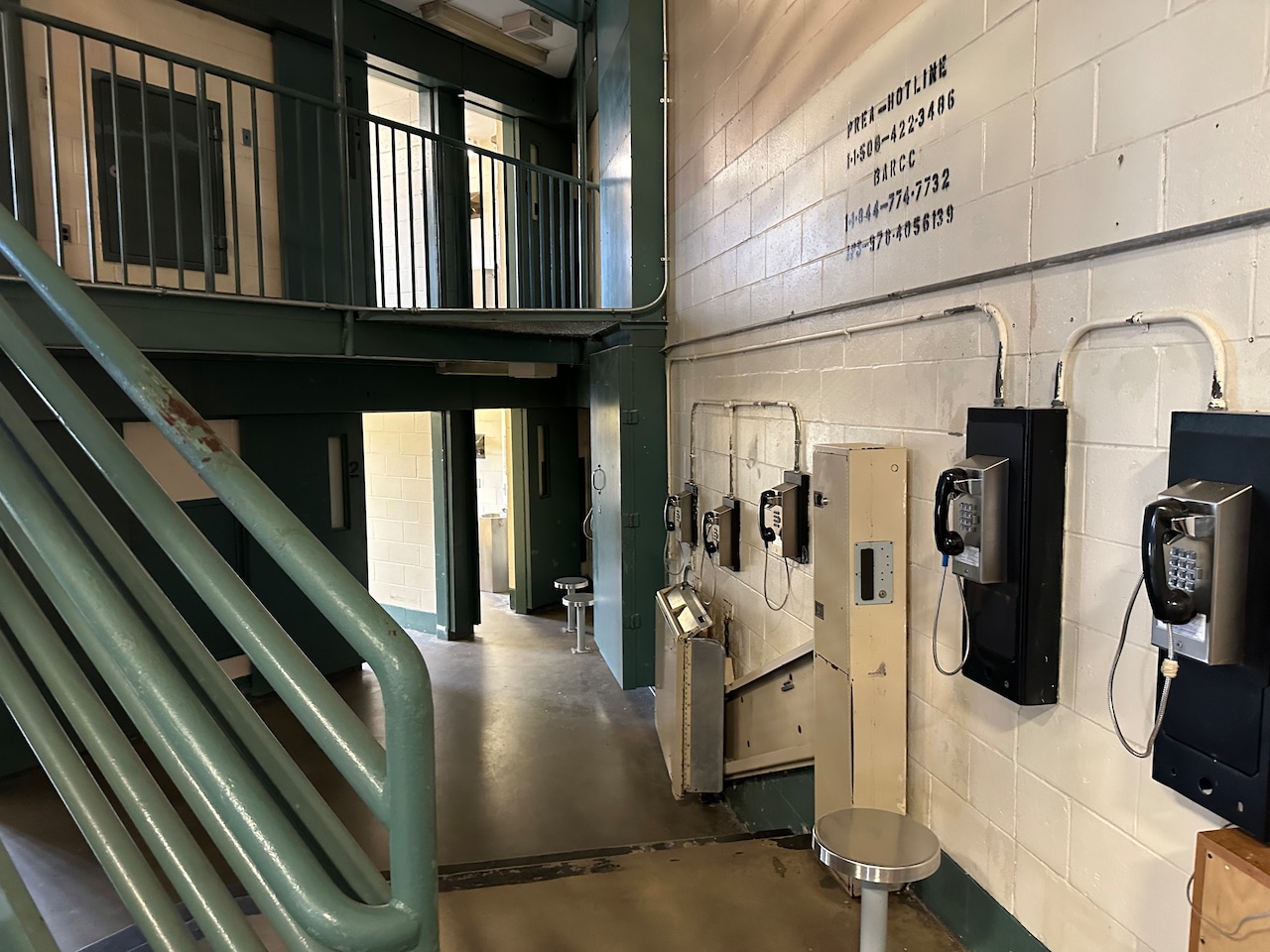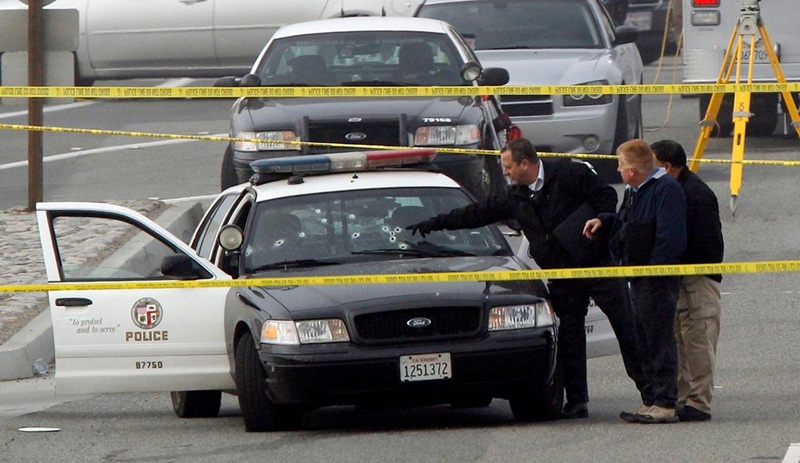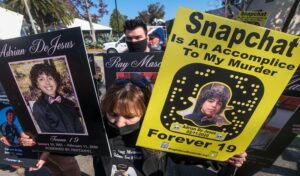
Local Breaking Police News

17 hours ago
Third man involved in Mass. basketball star’s 1993 killing given parole
A third man convicted in the 1993 killing of a beloved high school basketball star described as having a “heart like a gladiator” has been granted parole after being given an unlikely second chance at life. At about 4 a.m. on March 28, 1993, Kevin Christopher, 23, and 21-year-old Lloyd Industrious, cousins, were killed after leaving a party in Mattapan.Eyewitnesses told officials a group involving 20-year-old Marcus Edwards, 20-year-old Michael Payne, 18-year-old Lonnie Watkins and a 15-year-old fired several shots into a vehicle that the two men had been sitting in in Dorchester. One of the people in the group took a gold necklace from Christopher, and ran from the scene.Christopher had 11 gunshot wounds and Industrious had seven gunshot wounds. Both men died from their injuries. A police ballistics expert testified that at least four different guns had been used to shoot Christopher and Industrious, according to court documents.Read more: Once condemned to die in prison, dozens of inmates are being freed. Second chance — or nightmare?Industrious was working at a distribution center in Cambridge for a large department store when he was killed, The Boston Globe reported. But he was known for thriving on the basketball court.He had been captain, most valuable player and leading scorer during his four years at Madison Park High School. His coach, Dennis Wilson, told the Globe he had also been an honor student and was “a perfect gentlemen.”He led the team to its 1989 City Championship, scoring 22 points.“We couldn’t have won without him. He was my go-to guy,” Wilson said. “He had a heart like a gladiator and never hesitated to give the team his all.”He eventually went to Mercer University to play basketball and had been thinking about going to Northeastern University, the Globe reported.Christopher was taking time off from attending Wentworth Institute of Technology and working as a security guard when he was shot and killed.Edwards and Payne were tried together, while Watkins faced his own trial. The 15-year-old was tried as a juvenile.On June 21, 1994, following a jury trial in Suffolk Superior Court, Edwards and Payne were found guilty of two counts of first-degree murder and were sentenced to life in prison without the possibility of parole.An eyewitness had selected Payne’s photo out of 14 other photographs. However, Payne stated that he attended the nearby party but he was not involved in the murders. He claimed that he learned about the murders for the first time on the news.Their lawyers said the men had been misidentified by people drinking at the party, according to the Globe in 1994.On June 28, 1994, Lonnie Watkins was convicted by a jury of first-degree murder and was sentenced to two concurrent life terms.After the trial, Mavis Evans said the men who killed her brother should be put to death. Industrious’ mother agreed.“Words can never describe the hurt, the agony and pain that this tragedy has caused our family,” Evans said.Read more: Mass. cold case killer up for parole — but family says, ‘We are still suffering’More than 30 years later, the men involved in the shooting are getting a second chance.Despite being sentenced to life in prison without the possibility of parole, the men became eligible for parole in January 2024 after the Supreme Judicial Court ruled in Commonwealth v. Mattis that sentencing people ages 18 through 20 at the time of their offense to life without the possibility of parole was unconstitutional and amounted to “cruel and unusual punishment.”Massachusetts was the first state in the country to transform the law, experts said.“Essentially, the brains of what we are calling ‘late adolescents’ or ‘emerging adults’ function very much like juveniles,” Northampton attorney Paul Rudof, one of the lawyers who successfully challenged life sentences for individuals aged 18 to 20, told The Republican.Overall, there were 210 cases that fell into the Mattis decision across Massachusetts.Payne went in front of the parole board for the first time on Feb. 19. But was denied parole on June 30, with the Massachusetts Parole Board stating there were “concerns” following his statements at the hearing.Payne told the parole board that the programming offered through the state would not be beneficial for him “and self-improvement is not a need area,” the parole board wrote in its decision.There will be another review in two years.Edwards, now 52, faced the parole board next.He’s been in prison for 32 years but began to engage in rehabilitation and self-development in the early stages of his incarceration, the parole board noted.During his May 27 hearing, the board and Edwards talked about how he had completed numerous rehabilitative programs including Vocational Training, Restorative Justice, Violence Reduction and Criminal Thinking.On its Oct. 23 decision, the parole board said Edwards “appears to have benefitted” from the programs.He is considered a low risk for future violations and a low risk for recidivism.He was granted parole after six months in a lower security facility.Read more: ‘Didn’t see her as a human’: Mass. man denied parole 30 years after murderWatkins also went in front of the parole board this year. His appearance was on Aug. 14.During his hearing, the board noted he had “several medical conditions." He also, the board said, "presents with insight into his actions." Watkins has not received any disciplinary reports since 2017 and has engaged in rehabilitative programming, including Alternatives to Violence and Victim Offender Education Group. Suffolk County Assistant District Attorney Montez Haywood spoke in opposition to Edwards and Watkins getting parole.Family members have previously spoken on behalf of both victims asking that those incarcerated not get parole. For Watkins, the victims’ family members wrote a statement asking the parole board to not grant parole. The court’s Mattis decision has been devastating for the families of those killed as they are forced to relive the trauma, often going in front of the parole board and the incarcerated individual to make their own case.Ultimately, the Massachusetts Parole Board granted Watkins parole after 90 days in lower security. He is currently at MCI-Norfolk.
17 hours ago
Mass. weather: Extreme cold threatens frostbite as state readies for possible ‘bomb cyclone’
Arctic air is set to blast Massachusetts on Thursday, dropping temperatures to dangerous levels across the state while another snowstorm could be looming over the weekend.The National Weather Service has issued a Cold Weather Advisory for the entire state from 7 p.m. Thursday to 11 a.m. Friday. Temperatures are expected to plunge below zero in some areas, with wind chills measuring significantly lower.Boston, Worcester and Springfield will see high temperatures in the low 20s Thursday afternoon, while Pittsfield will only get up to 16 degrees. As the sun goes down, temps will drop dramatically.Boston will reach a low of 2 degrees overnight, while Worcester and Springfield will bottom out at minus 2 degrees, according to the National Weather Service. Pittsfield will get as low as minus 4. Cape Cod & the Islands will see a low of 7 degrees.Overnight winds will make conditions dangerous for people to be outside. Boston’s wind chill will be minus 10, Worcester and Springfield will be around minus 14, Pittsfield will be minus 20 and Cape Cod & the Islands will be minus 7 degrees.According to the Cold Weather Advisory issued by the National Weather Service, exposure to those conditions for as little as 30 minutes can result in hypothermia or frostbite.Friday will be even colder, with overnight sub-zero temperatures across the state.Forecasters are still monitoring the potential for a “bomb cyclone” storm that could be forming offshore. If the storm tracks toward land, it would likely hit Massachusetts on Sunday and could bring extreme weather such as snow and coastal flooding. Meteorologists will be able to predict the storm’s path with more confidence beginning Thursday evening.
17 hours ago
Celtics turned down trade offer that included Bulls center
The Celtics are scouring the trade market for some big men ahead of next week’s deadline. They are understandably being picky about who they go after to upgrade the frontcourt with one news surfacing of one proposal that was rejected by Boston earlier this year.According to Michael Scotto of Hoopshype, the Celtics turned down a proposal from the Chicago Bulls that would have sent center Nikola Vucevic to Boston in exchange for Anfernee Simons and a first-round pick. The move would have delivered some financial benefit to Boston since Vucevic ($21.5 million) makes about $7 million less than Simons, which would have saved Boston tens of millions in luxury tax repeater penalties. However, the Celtics have shot up the Eastern Conference standings in the past two months with Simons being an integral part of the team’s success off the bench. Moving Simons certainly remains an option at this point for Boston but they will be seeking a bigger talent upgrade than Vucevic for that type of package.The Bulls big man would be a useful player with his offensive skillset but there are a couple of red flags that make him a less than ideal target for Boston. He’s 35 years old, which magnifies his defensive limitations as he can be repeatedly attacked in the pick-and-roll by faster players. He will also be a free agent this offseason, making him a flight risk. The Celtics will be looking for a longer term answer for their center depth if they are moving notable draft capital for a higher salaried player. Whether they can find the right fit for that type of upgrade in the next week is the question worth watchingThe NBA trade deadline is on Feb. 5 at 3 p.m.
18 hours ago
Southwick starts planning for 250th celebration of country’s founding
SOUTHWICK — It’s still early, but the town is getting prepared to celebrate the country’s semiquincentennial, which the Select Board discussed briefly at their meeting Monday.“So we wanted to invite you here to inform us if you have any plans in the works for the 250th anniversary of the country; what those might be, when they might be being planned, and see if we can coordinate, facilitate or help you with that,” said Select Board Chair Diane Gale during the meeting.While the Historical Commission’s Russ Fox didn’t attend the meeting, Select Board member Douglas Moglin said the commission is planning to have several events that will coincide with Aug. 15, which is when the town’s annual summer fireworks show will be held.Coordinated by the Southwick Civic Fund, its president Joseph Deedy said Tuesday that plans are underway to have a couple of rides for children on that Saturday, food trucks, and a live band in addition to the fireworks.“We’re also planning some form of the Fireman’s Parade that was held for decades,” Deedy said.Last year, there was talk of trying to hold a Fireman’s Carnival, but Deedy said there’s “just no funding for that.”Moglin also said there are plans to have some Revolutionary War re-enactors at the Aug. 15 fireworks show, and for Veterans Day on Nov. 11.He then announced that he was going to include an article on the warrant for the May Town Meeting to create a revolving account for flags that would be flown on lampposts throughout town with the names and faces of Southwick military veterans.“I would like to kick off that program to hopefully maybe have some things set up to have them on display for August, but definitely for November,” Moglin said.Board member Diane Gale said the town should use its website to promote events. “That way we can help promote everything that’s going on in town, regardless of who’s doing it,” she said.Public Library Director Lynn Blair said her staff has already made plans for several events.She said that in April, a park ranger from the Springfield Armory will have a presentation about the Continental Arsenal.Local historian Dennis Picard will be at the library in July for a presentation on local patriots. Picard had been a museum professional in the “Living History” field for over 30 years. He spent over a decade at Old Sturbridge Village, filling various positions, including “lead interpreter.” In August, the library will host a speaker to Mercy Otis Warren, an American activist poet, playwright and pamphleteer during the American Revolution. During the years before the Revolution, she had published poems and plays that attacked royal authority in Massachusetts and urged colonists to resist British infringements on colonial rights and liberties, according to Wikipedia.Blair said the library will use those events to promote the library’s resources, like assisting residents with genealogy and finding ancestors with connections to the Revolution.“We’re also willing to help promote any other organizations, events, and we’d be happy to share any posters to spread the word,” she said.As the discussion wound down, Gale suggested that the board invite other groups to a meeting to see what else may be in the planning stages so the town can coordinate with them.
18 hours ago
Gateway Regional ambassadors attend Project 351 kickoff in Boston
HUNTINGTON — On Saturday, Jan. 17, five Gateway Regional students joined eighth graders from across the commonwealth to begin their year as 2026 Project 351 ambassadors. “They spent the day in service of others, had the opportunity to connect with students from across the state and celebrate the legacy of Martin Luther King,” said Gateway eighth-grade teacher and Project 351 Coordinator Hannah Sullivan.Project 351 is a program started under then-Gov. Deval Patrick in 2011 as a movement of hope-in-action, bringing together eighth graders from every city and town in the commonwealth to unite as one “community in service” for causes greater than themselves.Representing Gateway this year are Leah Boyer from Huntington, Ava Christie from Russell, Ella DeGregorio from Montgomery, Haylee Hussey from Middlefield and Parker McLaughlin from Blandford. Sullivan, who has been leading the Project 351 effort at Gateway since 2014, said the students are selected by the eighth-grade team and invited to join the community service effort.Asked why they wanted to join, Parker said, “Because I wanted to help people.” “I thought it would be a good experience,” said Leah, with Ava adding, “It seemed fun.” The group had a busy day. “We started the day in Faneuil Hall as a whole group — all ambassadors and alumni from across the state. Then, for the afternoon, Haylee and Parker went to Cradles to Crayons in Newton, and Leah, Ava, Ella, and myself went to IBEW 103 in Dorchester, where different charitable organizations had sent up stations,” Sullivan said. She said ambassadors also went to a third service site at La Collaborative, and all afternoon, they assembled hygiene kits and meal kits at the three different sites.“It was really cool. We helped a lot of people, like 25,000,” said Ella, which is the number of people who were impacted through the work of the ambassadors that day.At the end of the day, the entire group of about 400 ambassadors reconvened at the JFK Memorial Library for a ceremony and party. “Larger cities have the opportunity to bring more than one student. The party at the end was at the JFK Memorial Library. They had an opportunity to meet all the kids who joined,” said Sullivan.“The party afterwards was fun,” said Ava.“We met a lot of people. We’re in a big Project 351 group chat — there’s like 100 kids in it,” Ella said.The Gateway group also brought home a box of hygiene kits and meal kits assembled by ambassadors from across the state that were donated to the Gateway Free Store. All but Haylee said this was their first experience doing community service. “I helped with community soccer programs, but that’s it,” she said.Sullivan said the next step for the group is a spring service project. “Project 351 students typically support Cradles to Crayons, a statewide organization. We have always supported It Takes a Village and its store within the school for the spring service project,” she said, adding that there is another service project in the fall, when the Project 351 students do a 9/11 tribute and collect food. She said the fall project is run by the high school.Asked what she likes best about Project 351, Sullivan said, “I think it gives ambassadors the chance to meet other students across the state, and they get to help the commonwealth at the same time. It broadens their worldviews.”
18 hours ago
Bay State Conference: Milton on the move in newest boys basketball rankings
Needham (12-1, No. 1) Newton North (9-4, No. 2) Brookline (9-4, No. 3)Milton (9-5) (No. 5)Walpole (7-6, No. 4) Natick (6-7, No. 6) Braintree (5-7, No. 7)Wellesley (5-8, No. 8) Framingham (2-11, No. 9) Weymouth (0-12, No. 10)Milton was the biggest mover in this week’s rankings. The Wildcats dropped a game on Tuesday against Needham after winning back to back against Canton and Framingham. The team’s recent run of play moved it one spot up, jumping over Walpole. The team’s next two games are crucial for the program heading down the stretch: Brookline and Walpole. The team tips off against the Warriors on Friday on the road. Walpole has dropped three games in a row for the first time this season, losing games to Norwood, Newton North and Bishop Feehan, moving it down a spot. The team will try to bounce back against Braintree, a team it beat earlier in the season, at home on Friday.Needham held strong at No. 1 this week following wins against Natick and Milton. The Rockets take on Weymouth on Friday, Framingham on Tuesday next week and Braintree on Feb. 6 before it closes out the season with a tough final three games against Walpole, BC High and Malden Catholic.
18 hours ago
Bay State Conference Girls Basketball Rankings: Needham with statement win over Natick
Previous Rankings: Preseason, Dec. 19, Jan. 8, Jan. 15, Jan. 23Just when Needham thought it cleared its biggest hurdle to winning the Bay State Conference title, the Rockets got a reminder why the conference may be the toughest in the state.Last Friday, Needham took down Natick in overtime 47-40. Eva Andrews recorded a 13 point-23 rebound-10 block triple-double, while Natick’s Bridget Pole dropped 12 points.The win handed Natick its second Bay State loss while the Rockets remained undefeated within the conference.That all changed Tuesday.While the rest of the league postponed its games, Needham and Milton powered through after the snowstorm. Thanks to a combined 30 points from the Fish sisters, the Wildcats pulled off the big win, 46-41.Here are this week’s Bay State Conference rankings (record and previous ranking in parentheses):Needham (10-3, No. 1)Natick (10-2, No. 2)Walpole (9-3, No. 3)Braintree (9-3, No. 4)Milton (8-7, No. 6)Brookline (6-5, No. 5)Newton North (4-8, No. 7)Wellesley (3-8, No. 8)Weymouth (1-11, No. 9)Framingham (1-11, No. 10)With most of the Tuesday slate getting postponed, there wasn’t too much action to change the standings. Milton’s win pushed it into the top half of the league, but previous losses to Walpole and Braintree prevent it from moving up further for now.Walpole picked up the win in its first game at the school’s new fieldhouse. The Timberwolves beat Norwood (46-41), which is also ranked in the top-10 for Division II.Friday presents an interesting slate of games for the middle-tier teams of the conference that should shake up the rankings. Braintree hosts Walpole in a battle for the third spot in the rankings. Meanwhile, Brookline and Milton will face-off to determine who stays in the top half of the league.
18 hours ago
‘You could hear a pin drop,’ said WMS principal about recent assemblies
WESTFIELD — Principal Jesse McMillan said during a visit last week to Westfield Middle School, motivational speaker Terrence Lee Talley’s message of hope and resilience was well received. McMillan said he found Talley, a widely recognized speaker in K-12 education, through a national principals networking group. When he posted asking for reputable speakers, McMillan said Talley’s name came up quite a bit.Talley, who is from Minnesota, spent the day in Westfield on Jan. 22 giving four presentations, one to seventh-grade students in the auditorium and one to eighth-grade students, leading a staff meeting at the end of the day and an evening event for families at 6 p.m.“The kids responded incredibly well,” McMillan said. Motivational speaker Terrence Lee Talley engages with students at Westfield Middle School. (SUBMITTED)The Westfield NewsOne of the topics Talley touched upon was mental health concerns in middle school and navigating teasing and bullying. McMillan said the school has a social-emotional curriculum that Talley’s message reinforced. “We needed to provide a unified message of hope, resiliency, and supporting one another — even people you don’t know.” “It wasn’t your traditional Powerpoint presentation. It was emotional through storytelling,” McMillan said. He meets students from all over the nation, and weaves in stories from his life, as a child, teen and adult. He talked about challenging relationships; a lot of experiences our own students have. “You could hear a pin drop in the auditorium,” McMillan said.McMilan said there were students Talley’s message had an impact on that he wouldn’t necessarily have expected. “It was really a beautiful thing,” he said, adding that afterwards he sent a message home to families letting them know it had been an emotional assembly for the students. He said the school also had counselors on hand to help them process it.“I kept hearing ‘we needed that’ — powerful coming from 13 and 14 year olds,” McMillan said. The overall theme of the assembly was don’t give up reaching out to others, no matter what life situations they’re going through, and encourage people to keep going, not only the people you know, but the ones you don’t know, he said. “Sitting in an auditorium with 350 kids — 700 in the school — can guarantee you that someone is weathering a storm. Be mindful of that in daily interactions. You don’t know what people are going through inside and outside of school.”McMillan said Talley used stories to help students understand a little more. Even if it’s not one they experienced themselves, it gave them perspective and a lens into someone else’s life.The presentation was made possible through a Hate Crimes Prevention Grant of $42,000 that WMS received from the Department of Elementary and Secondary Education through the end of the school year. The school applied for the grant after anti-semitic incidents in January 2025, in which a swastika was drawn on a WMS student’s notebook, and several other swastikas were found in the school.McMillan responded right away, sending a letter condemning the incidents, and following up by partnering with the Jewish Federation of Western Massachusetts to develop more appropriate resources for middle schoolers and inviting speakers to come in. “There have been no further anti-semitic incidents. Students responded incredibly well to that last year,” McMillan said, adding there is a lot to know and understand. “At the end of the day, what I tell students and staff, regardless of our own beliefs, it’s about being a good human being.”McMillan said what he tries to do when bringing in a speaker is to consider what impact that person will have when they leave. “What is it going to do when they leave those doors?”During a staff meeting following Talley’s visit, he said four or five staff members said that during their 25 years at the school, this was one of the most impactful presentations they’ve ever seen.“This was one of those presentations that they’re not going to forget. They may not remember word for word what he said, but they will remember absolutely how they made them feel,” McMillan said about the students’ responses. He also plans to follow up with a survey to the students for feedback, and what they think about bringing Talley back. If they do, McMillan plans to have him work with some small groups and classrooms.As for the remainder of the Hate Crimes Prevention grant, McMillan said he is looking into professional development for staff and administrators in the building, and also bullying prevention curriculum resources and materials.Although they have the Trails to Wellness curriculum, he wants to look into specific resources on bullying, to help students understand what it is, and how to address it — if they see it happening to others, or have experienced it themselves. He said by definition, bullying is repeated and targeted.McMillan said all of these topics require a community effort. “The school is responsible for having these conversations, which is why we’re doing this, but it’s a community effort. It just can’t be the school system,” he said.
18 hours ago
Westfield's Joshua Wagner makes 'dream' come true with D-I signing
Westfield baseball standout Joshua Wagner has found a new home to continue his academic and athletic career.Wagner announced on X (formerly Twitter) last week that he has committed to play Division I baseball for Merrimack College upon graduation. This has been a moment in the making for Wagner. So for his vision to finally become a reality is a dream come true.“It has always been a dream of mine to play Division I baseball,” Wagner said. “Ever since I was a little kid, I would watch these big-time schools and dream of playing for them. And that has stuck with me ever since I started playing the game.“I do have a few of my friends at Merrimack. But I think the main thing that made my decision a little easier was the campus there. I really enjoyed it, and it definitely made the decision a lot easier for me.”This spring will mark Wagner’s fourth and final season with the Bombers. And during his memorable tenure, Wagner has accumulated 136 strikeouts and has allowed 46 earned runs in 121 combined innings pitched thus far. On the offensive side, meanwhile, the senior has recorded 31 combined hits and 21 RBIs in 115 plate appearances thus far.But aside from those impressive figures, Wagner has also been a vocal leader who helped guide Westfield to the D-II state semifinals against Plymouth North in 2024. That said, it’s no wonder that Wagner has been named a Super 7 and First-Team All-Western Mass. selection for two consecutive years. But sometimes, those numbers don’t tell the complete story. “I think a few things that separate me from some other athletes is my mentality,” he said. “I go into every game confident and not let anything get in the way, and always keep a positive mindset toward the game. And also, I think my leadership is a big part of my game. I am also trying to bring up my teammates at all times and make sure they stay positive as well.”From left to right, Westfield baseball captains Josh Wagner (junior), Patrick Moore (senior), Chris Puza (senior), and Jackson LaValley (senior) pictured on Senior Night. (A.J. Arkoette Photo)The Westfield NewsWagner also wanted to commemorate some familiar individuals who helped set this dream into motion. The senior understands that most of these opportunities are made possible by hard work and dedication in the weight room and on-the-field effort.But Wagner also echoed the importance of his village. Because sometimes, those efforts and sacrifices alone are the essential difference makers when it comes to achieving moments like this.“A few people I would like to thank are my parents,” Wagner said. “Because without them, I am not the person I am today. And even being able to go to all of these events without them and giving me a ride, none of this would be possible. I would also like to thank my coaches from my travel team (Powerhouse Bulldogs), who also got me to where I am today.”2025 All-Western Mass. Baseball: Pioneer Valley leads for Classes A, B, C, & DDuring his final high school season, though, Wagner has remained hopeful that Westfield can raise its first regional crown since 2024 and then make one last deep run in the state postseason together. “My hope for my final season is to compete at the farthest point in MIAA baseball,” Wagner said. “A majority of the guys that are still on the team, including myself, have won a Western Mass. championship and have made it to the Final Four. We will have such a positive and strong squad this year, so the goal is to win the state championship.”
MORE ARTICLES BELOW ...

January 23, 2026
The National Police Association Endorses the No Bounties on Badges Act
INDIANAPOLIS, Jan. 23, 2026 — The attacks, harassment, and threats being leveled at law enforcement officers have become more brazen and ruthless. The Department of Homeland Security recently received intelligence that criminal cartels, in association with domestic extremist groups, are offering targeted bounties to assassinate officers and agents. In a nation based on laws and in which police officers are stewards of the Constitution, this behavior should never be tolerated. Thankfully, federal lawmakers have introduced the No Bounties on Badges Act (S. 3453 / H.R. 7114) to combat these heinous acts. This bill authorizes the U.S. Attorney General to establish rewards for information leading to the arrest or conviction of anyone who offers a bounty to kill, harm, or intimidate a police officer. The No Bounties on Badges Act, endorsed by the National Police Association (NPA), was introduced by Sen. Rick Scott (FL) in the U.S. Senate and Rep. Tim Moore (NC-14) in the House. It has been referred to the Senate and House Judiciary Committees. The text for the Senate bill is here; the text for the House bill, once available, will be here. Under current federal law, the government may offer financial rewards for information leading to the arrest or conviction of suspected criminal offenders. The No Bounties on Badges Act amends the U.S. Code to allow the Attorney General to offer specific rewards in cases where a bounty has been placed on an officer of the law. “That bounties are being placed on the lives of police officers demonstrates that yet another perverse line has been crossed. The government should be provided with every possible tool to protect these men and women from becoming targets,” said Paula Fitzsimmons, Legislative Director, National Police Association. “The No Bounties on Badges Act will go a long way in saving officers’ lives and bringing would-be assassins to full justice. It will also send a resounding message that violence perpetrated on police officers will not be tolerated,” Fitzsimmons added. The NPA is grateful to Sen. Scott and Rep. Moore for introducing the No Bounties on Badges Act. We ask members of Congress to protect our nation’s officers by supporting this bill. To support anti-crime, pro-police legislation, join the NPA’s Call to Action team. Receive email alerts on bills, including which lawmakers to contact. About: The National Police Association (NPA) is a nonprofit organization dedicated to supporting law enforcement through advocacy, education, and the courts. For more information, visit NationalPolice.org. ###
January 22, 2026
NPA Thank You cards received by Fort Worth, TX Police Department
The National Police Association sends Thank You cards to police supporters across the country. Those supporters fill them out with personal messages of encouragement, and the NPA delivers them to area departments to boost officer morale. We received an email from Fort Worth, TX Police Department East Division Commander, Antione J. Williams (pictured) confirming that cards were received. He emphasized that, despite challenging times, Fort Worth officers continue to serve with honor, integrity, and compassion, because they genuinely love what they do and remain committed to keeping their community safe. Showing support matters. A few words of encouragement can remind officers that the public sees them, appreciates them, and stands with them. 💙 To every supporter who signs a card: you make a difference. 🚓 To every officer reading one: thank you for your service.
January 22, 2026
The National Police Association Announces Reward for Information About the Person Who Shot 2 Portland Police Officers
INDIANAPOLIS, Jan. 22, 2026 — The National Police Association is announcing a $5,000 reward for information leading to the identification, arrest, and conviction of the individual responsible for the shooting of two police officers in Portland, OR on Monday night, January 19, 2026. The Portland Police Bureau reported that tactical teams are actively searching for the suspect, who is described as a white male in his mid-30s with facial hair. At the time of the incident, he was wearing a black baseball cap, a black jacket over a gray hooded sweatshirt, black pants, and black shoes. “This is a stark reminder of the dangers our officers face every day while serving and protecting our community,” Keith Wilson said during a press conference. “We are deeply concerned for the officers who were shot, relieved to learn they are in stable condition, and we wish them a full and speedy recovery. Our thoughts and prayers are with them and their families.” According to investigators, the shooting occurred at approximately 8:20 p.m. after officers responded to a report of a threat involving a weapon. Police located the suspect on Northeast Clackamas Street between Northeast 16th and Northeast 17th avenues. “The suspect fired shots at the officers, striking two of them,” the Police Bureau said in a statement. “Both officers were transported by ambulance to a local hospital, where they were treated and listed in stable condition.” Authorities said the suspect fled the scene on foot, prompting officers to establish a perimeter in an effort to contain him. Multiple specialized units, including the Special Emergency Reaction Team (SERT), Crisis Negotiation Team (CNT), Air Support Unit, Unmanned Aircraft Systems Unit, and K-9 teams, were deployed to assist in the search. As of the latest update, the suspect has not been located. Anyone with information is asked to call 911 or email detectives at homicidetips@police.portlandoregon.gov or call 503-823-0479. Reference case number 26-18537. PPB advised the suspect is considered armed and dangerous and should not be approached. The NPA’s reward program terms and conditions can be reviewed here: NPA Rewards. About: The National Police Association (NPA) is a nonprofit organization dedicated to supporting law enforcement through advocacy, education, and the courts. For more information, visit NationalPolice.org. ###
January 17, 2026
The National Police Association Endorses the Medal of Sacrifice Act: Paying Tribute to Our Nation’s Heroes
Without hesitation, police officers selflessly and routinely run directly into danger to protect the lives of others. In the process, tens of thousands of these men and women are assaulted or injured. Some tragically lose their lives. To honor these fallen heroes and acknowledge their sacrifice, Rep. Brian Mast (FL-21) has introduced the Medal of Sacrifice Act (H.R. 3497) a bill authorizing the President of the United States to present a customized medal to the families of eligible law enforcement officers killed in the line of duty. This bill, endorsed by the National Police Association (NPA), has been referred to the House Judiciary Committee. The text for the bill is here. The medal, to be crafted from high-quality sterling silver and vermeil, will feature the Great Seal of the United States, three oak leaves -representing strength and resilience- and the word “SACRIFICE.” Distinct from other existing public safety awards, this medal will specifically be used to pay tribute to officers and other first responders who made the ultimate sacrifice in service to others. A Commission consisting of 12 law enforcement officers appointed by the President would determine eligibility, promote the medal’s existence, and establish award presentation protocol. “Police officers knowingly place themselves in harm’s way to keep us safe and protect our sacred rights. Sadly, when one of these heroes is killed, their sacrifice is quickly forgotten, if even acknowledged,” said Paula Fitzsimmons, Legislative Director, National Police Association. “The Medal of Sacrifice Act provides a meaningful way to pay tribute to these heroes as well as to honor their families, who have sacrificed everything and continue to experience unimaginable grief. This medal will also serve as a symbol of the public’s profound gratitude for the men and women who stand between us and lawlessness and uphold the U.S. Constitution,” Fitzsimmons added. The NPA is grateful to Rep. Mast for introducing the Medal of Sacrifice Act, a bill that commissions the creation of a medal honoring law enforcement officers and other first responders who have lost their lives in service to others. May their sacrifices never be forgotten. To support anti-crime, pro-police legislation, join the NPA’s Call to Action team. Receive email alerts on bills, including which lawmakers to contact. About: The National Police Association (NPA) is a nonprofit organization dedicated to supporting law enforcement through advocacy, education, and the courts. For more information, visit NationalPolice.org.
January 9, 2026
The National Police Association Endorses the Providing Emotional Assistance with Relief and Love (PEARL) Act
INDIANAPOLIS, Jan. 9, 2026 — Support dogs provide therapeutic benefits for those struggling with the negative effects of trauma, stress, and grief. The act of petting a dog releases oxytocin and lowers stress hormones. Even being in the presence of a trained dog can help sufferers open up about their mental health struggles. It’s why the National Police Association (NPA) is pleased to support the Providing Emotional Assistance with Relief and Love Act (H.R. 3965), a potentially life-saving bill designed to benefit U.S. Customs and Border Protection (CBP) agents. This bill, also referred to as the PEARL Act, establishes a three-year pilot program permitting CBP to adopt dogs from local animal shelters and train them as support animals for their agents. This bipartisan bill, introduced by Rep. Tony Gonzales (TX-23), passed the House and has been referred to the Senate Committee on Homeland Security and Governmental Affairs. The bill referred to the Senate is available here. The PEARL Act, named for a retired CBP support canine, builds upon the agency’s Support Canine Program, which was established in 2023 to address the surge in mental health incidents among agents. The bill authorizes one million dollars in federal funding for the pilot program. “There is significant evidence that support dogs provide relief for individuals suffering with maladies like PTSD, depression, and anxiety. Our border patrol agents, who encounter grief and horrific events on a regular basis, deserve access to a robust program that incorporates dogs as therapeutic companions,” said Paula Fitzsimmons, Legislative Director, National Police Association. “The PEARL Act will provide CBP with additional support dogs to help agents overcome mental health struggles and improve agency morale. Even better, this bill addresses the overcrowding issues in our nation’s animal shelters by giving homeless dogs a new-found purpose,” Fitzsimmons added. The NPA extends its gratitude to Rep. Gonzales for introducing the PEARL Act, a thoughtful, cost-effective bill that has the potential to save the lives of both CBP agents and homeless dogs. We ask the Senate to prioritize this bill and work to ensure its passage. To support anti-crime, pro-police legislation, join the NPA’s Call to Action team. Receive email alerts on bills, including which lawmakers to contact. About: The National Police Association (NPA) is a nonprofit organization dedicated to supporting law enforcement through advocacy, education, and the courts. For more information, visit NationalPolice.org. ###
January 2, 2026
The National Police Association Endorses the Combatting Fentanyl Poisonings Act of 2025
INDIANAPOLIS, Jan. 2, 2026 — Social media platforms have become a leading marketplace for the sales and distribution of fentanyl and other illicit substances. Unsuspecting Americans, many of whom are teens and young adults, purchase what they believe to be legitimate prescription medications, only to receive pills laced with fentanyl. In response, federal lawmakers have introduced the Combatting Fentanyl Poisonings Act of 2025 (H.R. 5573), a bill that establishes government grants to help fight this scourge. This bipartisan bill, endorsed by the National Police Association (NPA), was introduced by Reps. Gabe Evans (CO-08) and Adam Gray (CA-13) is currently in the Judiciary Committee for consideration. The text for the bill is here. The bulk of the funding will be directed to state and local law enforcement agencies for use in locating and arresting those who use social media platforms to sell illicit substances. A second grant is earmarked for nonprofits, which may use the funds to hatch public awareness and mentorship campaigns, with a focus on young Americans. The third grant equips officers with tools to safely handle fentanyl and treat emergencies resulting from exposure. Funds for these programs originate from existing Byrne-JAG grants, administered by the U.S. Department of Justice. “Fentanyl has already killed tens of thousands of Americans, and it continues to leave nothing but devastation and despair in its wake. We need to equip law enforcement with the tools they need to battle this crisis once and for all,” said Paula Fitzsimmons, Legislative Director, National Police Association. “The Combatting Fentanyl Poisonings Act of 2025 will give law enforcement the critical resources they need to track, investigate, and arrest fentanyl dealers who prey on Americans via social media. This bill, which also funds public awareness campaigns and equips police officers with lifesaving tools and defensive gear, is a sound investment in our nation,” Fitzsimmons added. The NPA extends its gratitude to lawmakers for introducing the Combatting Fentanyl Poisonings Act of 2025, a thoughtful bill that provides law enforcement with the tools and protection they need to fight the fentanyl plague, and nonprofits the ability to promote public awareness initiatives. To support anti-crime, pro-police legislation, join the NPA’s Call to Action team. Receive email alerts on bills, including which lawmakers to contact. About: The National Police Association (NPA) is a nonprofit organization dedicated to supporting law enforcement through advocacy, education, and the courts. For more information, visit NationalPolice.org. ###
December 29, 2025
The National Police Association Endorses the DHS Suicide Prevention and Resiliency for Law Enforcement Act
INDIANAPOLIS, Dec. 19, 2025 — The dedicated officers and agents of the Department of Homeland Security (DHS) are regularly exposed to trauma, suffering, and grief. They work long and irregular hours, are subject to burnout, and contend with threats and assaults on their own lives. This unforgiving landscape has taken its toll on officers’ mental well-being and contributed to the tragic rise in suicides and attempted suicides being reported across DHS agencies. The stigma associated with mental illness, coupled with the fear of risking employment status, can make officers reluctant to seek help. A bipartisan legislative bill called the DHS Suicide Prevention and Resiliency for Law Enforcement Act (S. 2645 / H.R. 6548) addresses this mental health care crisis by establishing the Law Enforcement Mental Health and Wellness Program within DHS. This bill, endorsed by the National Police Association (NPA), was introduced in the U.S. Senate by Sens. Gary Peters (MI) and Josh Hawley (MO); and in the House by Reps. Bennie Thompson (MS-02) and Andrew Garbarino (NY-02). It has been referred to the House Homeland Security Committee and the Senate Homeland Security & Governmental Affairs Committee for consideration. The text for the Senate bill is here; the text for the House side bill is here. “We ask our federal law enforcement officers to work endless shifts, as they stave off assaults and threats and navigate hostile environments. These conditions can take a toll on anyone, even experienced officers. Along with our profound gratitude, we owe them access to the most effective and advanced mental health resources available,” said Paula Fitzsimmons, Legislative Director, National Police Association. “The DHS Suicide Prevention and Resiliency for Law Enforcement Act will help ensure that these brave men and women have access to life-saving support and resources on a confidential basis and without fear of retribution,” Fitzsimmons added. The NPA thanks the bill’s sponsors for introducing legislation that provides agents and officers of DHS with the wellness care they need and deserve. We ask Congress to give this bill the attention it requires. To support anti-crime, pro-police legislation, join the NPA’s Call to Action team. Receive email alerts on bills, including which lawmakers to contact. About: The National Police Association (NPA) is a nonprofit organization dedicated to supporting law enforcement through advocacy, education, and the courts. For more information, visit NationalPolice.org. ###
December 15, 2025
The National Police Association Endorses the Judicial Accountability for Irresponsible Leniency (JAIL) Act
INDIANAPOLIS, Dec. 12, 2025 — Judges who unleash violent criminal offenders onto our streets have helped foster a public safety crisis that defies logic. Irresponsible judicial decisions destroy innocent lives and communities, while they consume considerable police resources. This practice is also a disgrace to crime victims and their loved ones, who must watch powerlessly as the courts fail to dispense appropriate justice. A legislative bill called the Judicial Accountability for Irresponsible Leniency (JAIL) Act (S. 3239 / H.R. 5312) will hold judges who release repeat violent offenders pending trial accountable. This bill, endorsed by the National Police Association (NPA), was introduced in the U.S. Senate by Sens. Tim Sheehy (MT) and Marsha Blackburn (TN); and in the House by Reps. Randy Fine (FL-06), Anna Paulina Luna (FL-13), and Doug LaMalfa (CA-01). Specifically, if a state or federal judge releases a defendant pending trial who has been convicted of a violent crime and has a history of violent convictions, the JAIL Act allows the crime victim -or an immediate family member if the victim is deceased- to pursue civil damages against that judge. While the bill is focused on judges, victims will also be permitted to pursue civil action against other involved government entities, including prosecutors. “Judges have a legal and ethical obligation to mete out justice that serves the public, not their own personal convictions. Allowing violent criminals to prey on the innocent is antithetical to our nation’s foundational values, and unfortunately, this practice has been occurring with increasing frequency. In the best interest of crime victims and overall public safety, this irresponsible behavior needs to be addressed via legal avenues,” said Paula Fitzsimmons, Legislative Director, National Police Association. “The JAIL Act will bring much-needed change by holding those judges who subvert our criminal justice system by releasing repeat violent offenders onto our streets, legally responsible. Perhaps these judges will more carefully ponder whether their judicial decisions have the potential to upend lives,” Fitzsimmons added. The NPA extends its gratitude to the bill’s sponsors for recognizing that the government’s primary obligation is to keep its citizens safe. To support anti-crime, pro-police legislation, join the NPA’s Call to Action team. Receive email alerts on bills, including which lawmakers to contact. About: The National Police Association (NPA) is a nonprofit organization dedicated to supporting law enforcement through advocacy, education, and the courts. For more information, visit NationalPolice.org. ###
December 5, 2025
The National Police Association Endorses the Strengthening Resources for Our Schools (SROs) Act
INDIANAPOLIS, Dec. 5, 2025 — School resource officers (SROs) can be the most effective safeguard against the violence plaguing our nation’s schools. They can provide rapid response in active shooter situations, communicate crucial intelligence to other responding officers, and build rapport with their students. Police agencies struggling with staffing may not have the resources necessary to hire SROs; however, this leaves schools with fewer options. Recruiting retired military veterans and police officers is an effective way to fill this void. These professional men and women already possess the necessary skills and temperament, as well as a strong desire to protect and serve. What they need is an incentive to re-enter the workforce. A legislative bill called the Strengthening Resources for Our Schools Act (S. 3189 / H.R. 6120) accomplishes this by granting federal income tax exemptions on retirement pay for retired law enforcement officers and military veterans who return to work as SROs. The Strengthening Resources for Our Schools Act (SROs), also referred to as the SROs Act, was introduced in the Senate by Sens. Tim Sheehy (MT), Cynthia Lummis (WY), and James Justice (WV); and in the House by Reps. Ryan Zinke (MT-01), Donald Davis (NC-01), and Brian Fitzpatrick (PA-01). This bill, endorsed by the National Police Association (NPA), has been referred to the House Ways and Means Committee and the Senate Finance Committee. The text for the Senate bill is here; the text for the House side bill is here. “Who better to protect our nation’s young people than retired police officers and military veterans. These dedicated public servants have the experience, skills, training, and temperament required to do the job, and many of them continue to seek ways to serve their communities, even after retirement,” said Paula Fitzsimmons, Legislative Director, National Police Association. “The SROs Act will provide retired police officers and military veterans with an incentive to continue doing the lifesaving work they’re so passionate about, while providing schools with a lasting security measure. It will also benefit police agencies that may not have adequate resources to employ dedicated SROs,” Fitzsimmons added. To support anti-crime, pro-police legislation, join the NPA’s Call to Action team. Receive email alerts on bills, including which lawmakers to contact. About: The National Police Association (NPA) is a nonprofit organization dedicated to supporting law enforcement through advocacy, education, and the courts. For more information, visit NationalPolice.org. ###
December 4, 2025
The National Police Association Urges U.S. Supreme Court to Support LAPD Officer Toni McBride and Reject the War on Cops
INDIANAPOLIS, Dec. 4, 2025 — The National Police Association (NPA) today announced the filing of an amicus curiae brief with the U.S. Supreme Court in support of Los Angeles Police Department Officer Toni McBride, framing her case as a pivotal stand for America’s embattled law enforcement. The brief, submitted in City of Los Angeles v. Estate of Daniel Hernandez (No. 25-538), urges the High Court to overturn a controversial Ninth Circuit decision and reaffirm that split-second police decisions made in the line of duty must not be paralyzed by courtroom second-guessing. Officer McBride’s saga began with a chaotic April 2020 incident in South Los Angeles. A suspect high on methamphetamine caused multiple vehicle crashes and then emerged wielding a knife, advancing on McBride and ignoring her repeated commands to drop the weapon. With bystanders at risk, McBride fired to stop the threat. It took six shots over six seconds to finally subdue the knife-wielding assailant, who still clutched his weapon until the end. A Los Angeles County investigation deemed the shooting justified, as did a Federal District Court judge and the Ninth Circuit panel, but in a sharply divided 6-5 vote, en banc review by the Ninth Circuit Court of Appeals upended that outcome, insisting a jury should second-guess her from the safety of a courthouse. This judicial whiplash set the stage for a Supreme Court battle to restore the legal shield for officers facing life-threatening attacks. In its amicus brief, the NPA excoriates the Ninth Circuit’s approach as a betrayal of Supreme Court precedent and common sense. The Ninth Circuit majority effectively “repudiated the ‘reasonable officer’ construct required by this Court,” positing an “utterly unrealistic, quasi-judicial process of threat assessment as each shot is fired”, stated attorney for the NPA, James Buchal. By demanding that McBride pause to reassess in the middle of a deadly confrontation, the Ninth Circuit invited exactly the kind of judicial second-guessing the Supreme Court has warned against. “Police officers cannot effectively maintain control of violent offenders on the Nation’s streets, and prevent further injury to the public if their only option is to retreat,” Buchal continued, noting that stripping officers of decisive authority would create an unreasonable risk to the lives of police officers and the public. The NPA’s brief places heavy emphasis on the physiological and tactical realities of lethal force encounters, realities the appellate judges, in the NPA’s view, dangerously ignored. When an armed suspect is charging or even after he falls wounded, he can still pose a mortal threat in the blink of an eye. Research cited in the brief confirms that a person shot multiple times can continue moving and fighting for crucial seconds (indeed, McBride’s assailant was still armed and struggling on the ground). When facing a crazed, knife-wielding attacker, even a moment’s hesitation can be fatal. The NPA’s brief vividly drives this point home, describing how an officer in McBride’s position experiences a flood of adrenaline and tunnel vision, with mere milliseconds to decide life or death. In such a scenario, McBride’s actions were not only reasonable but heroic. The National Police Association is represented by James L. Buchal, of Murphy & Buchal LLP, in Portland, OR. The full brief is available on the Supreme Court docket under case number 25-538 and can be read here. The National Police Association (NPA) is a nonprofit organization supporting law enforcement through advocacy, education, and the courts. For more information, visit NationalPolice.org. ###
November 6, 2025
The National Police Association Supports the “Larry Henderson Act” in Written Testimony to Ohio House Judiciary Committee
INDIANAPOLIS, Nov. 6, 2025 / — The National Police Association (NPA) has submitted written testimony to the Ohio House Judiciary Committee in support of the Larry Henderson Act (H.B. 372), a vital measure sponsored by Representatives Cindy Abrams (29) and Phil Plummer (39) that ensures convicted killers of police officers and other first responders face the maximum, unmitigated penalty under Ohio law. The testimony can be read here. In the testimony presented by NPA Legislative Director Paula Fitzsimmons, the NPA called on lawmakers to end the re-traumatization of families of fallen officers by closing the parole loophole for those convicted of the aggravated murder of a law enforcement officer. “When a police officer is killed in the line of duty, their families, loved ones, and colleagues experience unimaginable grief,” Fitzsimmons wrote. “This gaping wound gets ripped open when an offender becomes eligible for parole.” Under current Ohio law, the death penalty or a life sentence may be imposed for the intentional killing of an officer, but parole eligibility can still arise in certain circumstances. The Larry Henderson Act eliminates that possibility, requiring courts to impose either the death penalty or life without parole. It also extends those same protections to prosecutors, first responders, and military personnel targeted because of their service. This legislation comes amid a surge in violence against police. According to the FBI, 85,730 officers were targeted in the United States last year alone, the highest number in over a decade. The NPA emphasized that this bill represents a moral and legal commitment to the safety of those who protect the public, ensuring that the justice system delivers certainty and closure for their families. “The Larry Henderson Act ensures that the full force of the law is applied to those who intentionally kill our nation’s protectors,” said Fitzsimmons. “Justice demands nothing less.” The NPA urges Ohio lawmakers to adopt the Larry Henderson Act as a substantive strengthening of public-safety protections in the State. By doing so, Ohio sends a clear message: attacks on those who protect us will be met with the full force of justice. About: The National Police Association (NPA) is a nonprofit organization dedicated to supporting law enforcement through advocacy, education, and the courts. For more information, visit NationalPolice.org. ###
MORE ARTICLES BELOW ...
January 29, 2026 4:15 pm
Ohio officer reinstated to active duty after acquittal in fatal 2023 OIS
January 28, 2026 9:45 pm




















